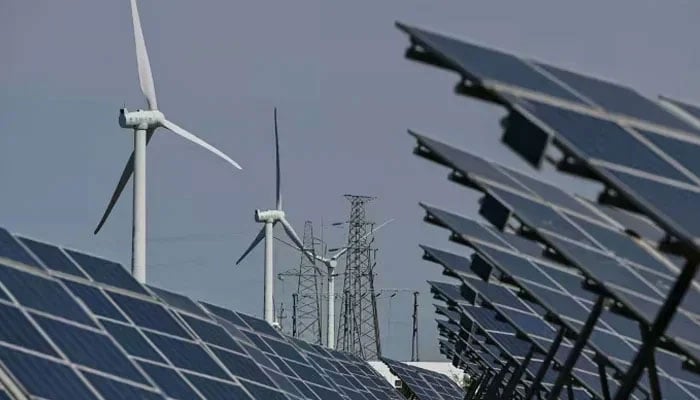Experts urge innovative financing, reforms to de-risk renewable energy investments
Islamabad: Renewables First (RF), a leading think tank for energy and environment, successfully hosted a pivotal event titled ‘Renewable Energy Finance Insights - Assessing Risks in a Changing Landscape’ on Tuesday here. This initiative aimed to bridge the gap between financial sector stakeholders and power sector policymakers, fostering a collaborative dialogue on critical issues, particularly the high cost of financing for solar and wind energy in Pakistan, says a press release.
Pakistan has made notable strides in utility-scale solar and wind projects; however, attracting further investments remains a significant challenge due to Pakistan’s risk profile and macroeconomic conditions. To address these issues, Ahtasam Ahmad from Renewables First presented its latest study, ‘Capitalising on Green: A Stocktake of Renewable Energy Finance for Pakistan.’ The report maps the current state of renewable energy financing and highlights the obstacles that have kept the cost of capital high, thereby stalling progress in renewable energy investment. The event brought together regulators, lenders, investors, developers, advisors, and public sector representatives, creating a platform for collaborative discussions and potential de-risking measures.
Farid Ahmed Khan, CEO of Bank of Punjab highlighted the scarcity of capital market investors in renewable energy and encouraged both local and foreign entrepreneurs to invest in this sector. He pointed out the high-risk nature and resultant high costs that drive up prices, proposing solutions such as promoting Development Finance Institutions (DFIs) and increasing capital market participation in energy projects.
Shehzad Abdullah, Head of Investment Banking at JS Bank, reflected on the evolution of wind power financing since 2011, emphasising the learning curve through successive generations of financing. He noted the pivot in market dynamics and highlighted the need for consistent policies and more engaging conversations to drive progress. Navid Goraya, chief investment officer at Karandaaz, highlighted the need for exploring alternate mechanisms for financing renewable energy projects, presenting securitisation as an avenue to free up liquidity for the financial sector.
Ali Khizar, head of BR research at Business Recorder, and Afia Malik, Senior Economist at PIDE, advocated for decentralization and the use of local currency in financing, respectively.
Developers from China Three Gorges, Foundation Wind, and UEP stressed the importance of integrated planning, robust transmission infrastructure, and streamlined permitting and land acquisition processes to reduce the risk profile of renewable energy technologies.
Shah Jahan Mirza, managing director of PPIB emphasised the need for a concerted effort from all stakeholders to pave the way forward for sustainable energy solutions in Pakistan. The discussants unanimously agreed that reviving the renewable energy finance space is crucial, and exploring alternate financing channels through innovative instruments and de-risking measures is imperative to unlock the sector’s potential.
-
 Jonathan Majors Set To Make Explosive Comeback To Acting After 2023 Conviction
Jonathan Majors Set To Make Explosive Comeback To Acting After 2023 Conviction -
 Next James Bond: Why Jacob Elordi May Never Get 007 Role?
Next James Bond: Why Jacob Elordi May Never Get 007 Role? -
 Maddox Drops Pitt From Surname In Credits Of Angelina Jolie’s New Film 'Couture' Despite Truce From Father's End In Legal Battle
Maddox Drops Pitt From Surname In Credits Of Angelina Jolie’s New Film 'Couture' Despite Truce From Father's End In Legal Battle -
 Burger King Launches AI Chatbot To Track Employee Politeness
Burger King Launches AI Chatbot To Track Employee Politeness -
 Andrew’s Woes Amid King Charles’ Cancer Battle Triggers Harry Into Action For ‘stiff Upper Lip’ Type Dad
Andrew’s Woes Amid King Charles’ Cancer Battle Triggers Harry Into Action For ‘stiff Upper Lip’ Type Dad -
 Experts Warn Andrew’s Legal Troubles In UK Could Be Far From Over
Experts Warn Andrew’s Legal Troubles In UK Could Be Far From Over -
 Teyana Taylor Reflects On Dreams Turning Into Reality Amid Major Score
Teyana Taylor Reflects On Dreams Turning Into Reality Amid Major Score -
 Jennifer Garner Drops Parenting Truth Bomb On Teens With Kylie Kelce: 'They're Amazing'
Jennifer Garner Drops Parenting Truth Bomb On Teens With Kylie Kelce: 'They're Amazing' -
 AI Is Creating More Security Problems Than It Solves, Report Warns
AI Is Creating More Security Problems Than It Solves, Report Warns -
 'Game Of Thrones' Prequel 'A Knight Of The Seven Kingdoms' New Ratings Mark Huge Milestone
'Game Of Thrones' Prequel 'A Knight Of The Seven Kingdoms' New Ratings Mark Huge Milestone -
 Apple Seeks To Dismiss Fraud Suit Over Siri AI, Epic Injunction
Apple Seeks To Dismiss Fraud Suit Over Siri AI, Epic Injunction -
 Delroy Lindo Explains The Crucial Role Of Musical Arts In Setting Up His Career Trajectory
Delroy Lindo Explains The Crucial Role Of Musical Arts In Setting Up His Career Trajectory -
 Timothée Chalamet Reveals How He Manages To Choose The Best Roles For Himself
Timothée Chalamet Reveals How He Manages To Choose The Best Roles For Himself -
 Princesses Beatrice, Eugenie’s Conflict Gets Exposed As Mom Fergie Takes Over The Media
Princesses Beatrice, Eugenie’s Conflict Gets Exposed As Mom Fergie Takes Over The Media -
 Kate Middleton Plays Rock-paper-scissors In The Rain
Kate Middleton Plays Rock-paper-scissors In The Rain -
 Lindsay Lohan On 'confusing' Teen Fame After 'Mean Girls': 'I Should Have Listened To My Mom And Dad'
Lindsay Lohan On 'confusing' Teen Fame After 'Mean Girls': 'I Should Have Listened To My Mom And Dad'




